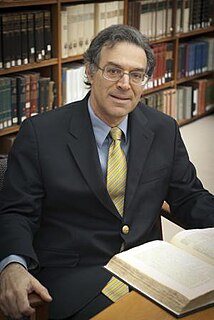Related Research Articles

The history of Europe concerns itself with the discovery and collection, the study, organization and presentation and the interpretation of past events and affairs of the people of Europe since the beginning of written records. During the Neolithic era and the time of the Indo-European migrations, Europe saw human inflows from east and southeast and subsequent important cultural and material exchange. The period known as classical antiquity began with the emergence of the city-states of ancient Greece. Later, the Roman Empire came to dominate the entire Mediterranean basin. The fall of the Roman Empire in AD 476 traditionally marks the start of the Middle Ages. Beginning in the 14th century a Renaissance of knowledge challenged traditional doctrines in science and theology. Simultaneously, the Protestant Reformation set up Protestant churches primarily in Germany, Scandinavia and England. After 1800, the Industrial Revolution brought prosperity to Britain and Western Europe. The main European powers set up colonies in most of the Americas and Africa, and parts of Asia. In the 20th century, World War I and World War II resulted in massive numbers of deaths. The Cold War dominated European geo-politics from 1947 to 1989. After the fall of the Iron Curtain, European countries grew closer together.

Hegemony is the political, economic, and military predominance of one state over other states. In Ancient Greece, hegemony denoted the politico-military dominance of the hegemon city-state over other city-states. In the 19th century, hegemony denoted the "social or cultural predominance or ascendancy; predominance by one group within a society or milieu" and "a group or regime which exerts undue influence within a society".
A city-state is an independent sovereign city which serves as the center of political, economic, and cultural life over its contiguous territory. They have existed in many parts of the world since the dawn of history, including cities such as Rome, Athens, Sparta, Carthage, and the Italian city-states during the Middle Ages and Renaissance, such as Florence, Venice, Genoa and Milan. With the rise of nation states worldwide, only a few modern sovereign city-states exist, with some disagreement as to which qualify; Monaco, Singapore, and Vatican City are most commonly accepted as such. Singapore is the clearest example, with full self-governance, its own currency, a robust military, and a population of 5.6 million.

Pax Britannica was the period of relative peace between the Great Powers during which the British Empire became the global hegemonic power and adopted the role of a "global policeman".

A great power is a sovereign state that is recognized as having the ability and expertise to exert its influence on a global scale. Great powers characteristically possess military and economic strength, as well as diplomatic and soft power influence, which may cause middle or small powers to consider the great powers' opinions before taking actions of their own. International relations theorists have posited that great power status can be characterized into power capabilities, spatial aspects, and status dimensions.

Kenneth Pomeranz, FBA is University Professor of History at the University of Chicago. He received his B.A. from Cornell University in 1980, where he was a Telluride Scholar, and his Ph.D. from Yale University in 1988, where he was a student of Jonathan Spence. He then taught at the University of California, Irvine, for more than 20 years. He was elected a Fellow of the American Academy of Arts & Sciences in 2006. In 2013–2014 he was the president of the American Historical Association.

The Asia–Europe Meeting (ASEM) is an Asian–European political dialogue forum to enhance relations and various forms of cooperation between its partners. It was officially established on 1 March 1996 at the 1st ASEM Summit (ASEM1) in Bangkok, Thailand, by the then 15 Member States of the European Union (EU) and the European Commission, the then 7 Member States of the Association of Southeast Asian Nations (ASEAN), and the individual countries of China, Japan, and South Korea. A series of enlargements saw additional EU Member States join as well as India, Mongolia, Pakistan and the ASEAN Secretariat in 2008, Australia, New Zealand and Russia in 2010, Bangladesh, Norway, and Switzerland in 2012, as well as Croatia, and Kazakhstan in 2014.

Environmental history is the study of human interaction with the natural world over time, emphasising the active role nature plays in influencing human affairs and vice versa.
A political union is a type of political entity which is composed of, or created from smaller polities, or the process which achieves this. These smaller polities are federated states in a federal government, or provinces in a centralised government. This form of government may be voluntary and mutual and is described as unionism by its constituent members and proponents. In other cases, it may arise from political unification, characterised by coercion and conquest. The unification of separate states which, in the past, had together constituted a single entity, is known as reunification. Unlike a personal union or real union, the individual constituent entities may have devolution of powers but are subordinate to a central government or coordinated in some sort of organization. In a federalised system the constituent entities usually have internal autonomy and share power with a federal government, for whom external sovereignty, military forces, and foreign affairs are usually reserved. The union is recognised internationally as a single political entity. A political union may also be called a legislative union or state union.
The history of journalism spans the growth of technology and trade, marked by the advent of specialized techniques for gathering and disseminating information on a regular basis that has caused, as one history of journalism surmises, the steady increase of "the scope of news available to us and the speed with which it is transmitted. Before the printing press was invented, word of mouth was the primary source of news. Returning merchants, sailors and travellers brought news back to the mainland, and this was then picked up by pedlars and travelling players and spread from town to town. Ancient scribes often wrote this information down. This transmission of news was highly unreliable and died out with the invention of the printing press. Newspapers have always been the primary medium of journalists since the 18th century, radio and television in the 20th century, and the Internet in the 21st century.

Giovanni Arrighi was an Italian economist, sociologist and world-systems analyst, from 1998 a Professor of Sociology at Johns Hopkins University. His work has been translated into over fifteen languages.
Urban history is a field of history that examines the historical nature of cities and towns, and the process of urbanization. The approach is often multidisciplinary, crossing boundaries into fields like social history, architectural history, urban sociology, urban geography, business history, and archaeology. Urbanization and industrialization were popular themes for 20th-century historians, often tied to an implicit model of modernization, or the transformation of rural traditional societies.

A financial centre, financial center, or financial hub is a location with a concentration of participants in banking, asset management, insurance or financial markets with venues and supporting services for these activities to take place. Participants can include financial intermediaries, institutional investors, and issuers. Trading activity can take place on venues such as exchanges and involve clearing houses, although many transactions take place over-the-counter (OTC), that is directly between participants. Financial centres usually host companies that offer a wide range of financial services, for example relating to mergers and acquisitions, public offerings, or corporate actions; or which participate in other areas of finance, such as private equity and reinsurance. Ancillary financial services include rating agencies, as well as provision of related professional services, particularly legal advice and accounting services.

East Asia, is the eastern region of Asia, which is defined in both geographical and ethno-cultural terms. The modern states of East Asia include China, Japan, Mongolia, North Korea, South Korea, and Taiwan. China, North Korea, South Korea and Taiwan are all unrecognised by at least one other East Asian state due to severe ongoing political tensions in the region, specifically the division of Korea and the political status of Taiwan. Hong Kong and Macau, two small coastal quasi-dependent territories located in the south of China, are officially highly autonomous but are under de jure Chinese sovereignty. East Asia borders Siberia and the Russian Far East to the north, Southeast Asia to the south, South Asia to the southwest, and Central Asia to the west. To the east is the Pacific Ocean and to the southeast is Micronesia.
This article covers the Economic history of Europe from about 1000 AD to the present. For the context, see History of Europe.
Robert Aldrich is an Australian historian and writer. Aldrich is a Professor of European History, he teaches and researches modern European and colonial history, including the history of France since the Revolution, the history of the French and British overseas empires, the history of 'sites of memory' and the history of gender and sexuality.

The 19th (nineteenth) century began on 1 January 1801 (MDCCCI), and ended on 31 December 1900 (MCM). The 19th century was the ninth century of the 2nd millennium.

The keffiyeh or kufiya also known in Arabic as a ghutrah (غُترَة), shemagh, ḥaṭṭah (حَطَّة), and in Persian as a chafiyeh (چفیه), is a traditional Arabian headdress.
John Milfull (1940-2016) was an Australian academic, educator and professor. In 1971 he was appointed as Professor of German and Head of the School of German at the University of New South Wales.
References
- ↑ Frank B. Tipton (2003), "ch. 3 A Revolutionary Generation", A history of modern Germany since 1815, ISBN 978-0-8264-4910-8
- ↑ Nationalism and National Culture: Germany in a Cross-Disciplinary Perspective
- ↑ Frank Tipton